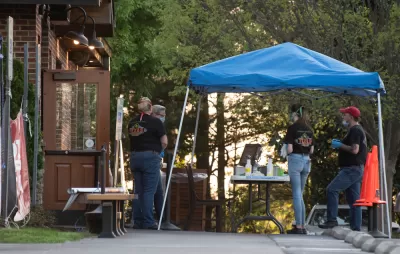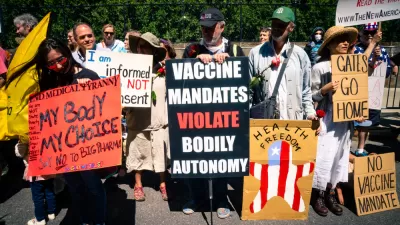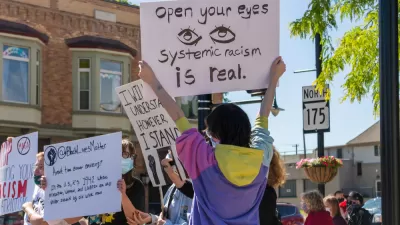The realities of social distancing are allowing for innovations and experimentations with real opportunities for long-term benefit in cities, according to an article by Allison Arieff.

Staying at home to stem the spread of the coronavirus has offered a rare experiment, according to an article by Allison Arieff: "We can see our cities for the first time without the choking traffic, dirty air and honking horns that have so often made them intolerable."
Arieff is encouraged by the adaptability of San Francisco during this time of crisis—residents have turned the city into a pedestrian's paradise, the streets are quieter, and the skies are bluer. Arieff also acknowledges that Covid-19 is also "laying bare the stark reality of income inequality," but some of the innovations and "MacGyvering" that have taken root in response to the crisis have the potential to create a new normal after the crisis has abated, according to Arieff.
One of the key ways that potential is being realized and showcased during the crisis is on streets: "Urban planners have long argued that more streets should close to make more livable spaces, but governments have always resisted, calling it impractical or impossible. They’ve just proved it can happen — and they should keep it going after the crisis."
The mere existence of this experiment in the public realm, and several other, smaller interventions, like deactivated pedestrian "beg buttons," offer some hope that cities will eventually act to prevent the worst outcomes of climate change. Time will tell whether these changes can last, according to Arieff, and for the many hopeful developments listed in this story, there are also concerning developments regarding privacy and discrimination.
FULL STORY: The Magic of Empty Streets

Planetizen Federal Action Tracker
A weekly monitor of how Trump’s orders and actions are impacting planners and planning in America.

Map: Where Senate Republicans Want to Sell Your Public Lands
For public land advocates, the Senate Republicans’ proposal to sell millions of acres of public land in the West is “the biggest fight of their careers.”

Restaurant Patios Were a Pandemic Win — Why Were They so Hard to Keep?
Social distancing requirements and changes in travel patterns prompted cities to pilot new uses for street and sidewalk space. Then it got complicated.

Platform Pilsner: Vancouver Transit Agency Releases... a Beer?
TransLink will receive a portion of every sale of the four-pack.

Toronto Weighs Cheaper Transit, Parking Hikes for Major Events
Special event rates would take effect during large festivals, sports games and concerts to ‘discourage driving, manage congestion and free up space for transit.”

Berlin to Consider Car-Free Zone Larger Than Manhattan
The area bound by the 22-mile Ringbahn would still allow 12 uses of a private automobile per year per person, and several other exemptions.
Urban Design for Planners 1: Software Tools
This six-course series explores essential urban design concepts using open source software and equips planners with the tools they need to participate fully in the urban design process.
Planning for Universal Design
Learn the tools for implementing Universal Design in planning regulations.
Heyer Gruel & Associates PA
JM Goldson LLC
Custer County Colorado
City of Camden Redevelopment Agency
City of Astoria
Transportation Research & Education Center (TREC) at Portland State University
Camden Redevelopment Agency
City of Claremont
Municipality of Princeton (NJ)





























